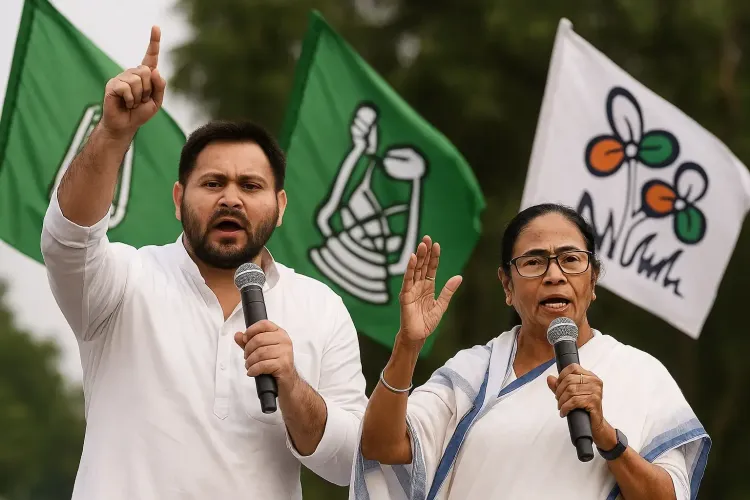How are ‘Bahari & Bohiragata’ Reshaping Political Discourse?

Synopsis
Key Takeaways
- Rhetoric of 'outsiders' plays a crucial role in regional politics.
- Tejashwi Yadav and Mamata Banerjee utilize these narratives to consolidate their voter bases.
- Election campaigns are increasingly shaped by perceptions of local versus external influence.
- The Representation of the People Act reinforces the principle of democratic representation.
- Regional parties may view 'outsider' narratives as threats to their political power.
New Delhi, Oct 29 (NationPress) Rashtriya Janata Dal (RJD) leader Tejashwi Yadav often highlights the “Bahari” issue, which resonates with the “Bohiragata” narrative of his national ally, Trinamool Congress (TMC) chief Mamata Banerjee. Both terms, when translated to English, signify “outsider”.
Despite originating from distinct states, political customs, and historical contexts, these terms share tactical similarities, differing intentions, and similar risks for democratic discussions and social unity.
For both leaders, any individual not endorsed by them, who poses a threat to their authority in their respective regions, is classified as an outsider.
Tejashwi’s repeated invocation of the “Bihari versus bahari” slogan aims to counter the Bharatiya Janata Party (BJP) narrative in Bihar, especially as national leaders campaign in the state and critics revive memories of past mismanagement associated with his party's legacy.
He has publicly positioned himself as a proud local challenging what he perceives as an external political force attempting to control Bihar’s affairs.
For Mamata, there was a period when even Congress leader Rahul Gandhi was labelled as an “outsider”, which she described as a seasonal bird entering her state solely to seek votes. She continues to apply the same classification to BJP leaders.
Critics argue that she overlooks the fact that the Trinamool itself has three Members of Parliament who could equally be considered outsiders to West Bengal.
Nonetheless, according to the Representation of the People Act, 1951, any elector for a Parliamentary constituency in India is eligible to represent any state or Union territory, with specific exceptions in places like Assam, Lakshadweep, and Sikkim.
For state assemblies, the qualifications specify that eligible candidates must be electors in the state, with additional conditions for certain regions. Consequently, Prime Minister Narendra Modi and Leader of Opposition Rahul Gandhi represent constituencies outside their respective home states.
This rhetoric is crafted specifically to build a political narrative and shape public perception. Mamata’s classification of central BJP leaders as outsiders is also criticized by the BJP’s state unit as a reaction to policies like the Citizenship (Amendment) Act and the National Register of Citizens.
The BJP, now the principal Opposition party in West Bengal, alleges that actions taken against actual outsiders are aimed at protecting the Chief Minister’s vote banks.
However, the Trinamool leadership portrays such actions as threats to the state’s cultural and political autonomy, a stance shared by other political parties in the region that oppose the BJP.
Meanwhile, Tejashwi’s rhetoric may have evolved from his resistance against the Election Commission’s Special Intensive Revision (SIR) in Bihar. Although he has yet to address specific concerns post-process, he continues to emphasize the “Bahari” narrative.
With the implementation of SIR in West Bengal and the upcoming elections in the state, an increase in “Bohiragata” rhetoric is anticipated.
The leaders referenced by Tejashwi and Mamata belong to a party that is currently steering the National Democratic Alliance (NDA) government at the Centre, elected by a majority mandate from the nation’s electorate.
In Bihar and West Bengal, the NDA garnered approximately 45.5% of the vote share in the former state, while the BJP secured 38.7% in the latter during the 2024 Lok Sabha elections.
Some analysts label this regional rhetoric as a tactic to divert attention from performance metrics to existential stakes, providing a mobilizational edge during intense campaign periods.










